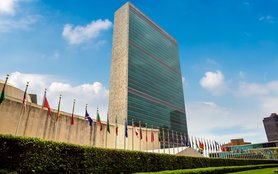The tax portion of the Ways & Means Build Back Better plan is a gift to US multinational corporations paid for by domestic businesses.
Earlier this week the House of Representatives’ Ways and Means Committee adopted its version of the President’s Build Back Better Plan. There is much to love in that bill: investments in families and in jobs-creating, climate-friendly infrastructure to the tune of $3.5 trillion over ten years, paid for by the rich and corporations.
But the bill misses a great opportunity: it leaves out much of the President’s aptly named Made in America Tax Plan. That plan would kill five birds with one stone, as it would:
- Fund the necessary investments;
- Eliminate the current tax incentives to offshore American jobs;
- End tax havens abuse by multinational corporations;
- End subsidies for climate-destroying fossil fuels;
- End the race to the bottom in corporate taxes (i.e., encourage other countries to raise their corporate taxes, too, thereby ending the worldwide and decades-long shift of the tax burden from corporations to families).
The key to doing all that is to target the foreign profits of multinational corporations.
Instead, the Ways and Means bill puts the tax burden squarely on domestic businesses.
Ways and Means tax provisions vs. President's proposal
The corporate income tax rate would increase from 21% to 26.5%. That's not as much as the President’s request (28%), but still significant, netting $540 billion over ten years. (The rate was 35% before the Trump Administration gave the rich a big tax cut in 2017.) Owners of unincorporated businesses–but only those earning over $400,000 a year as per the President’s red line–will also contribute through a series of changes to other business taxes and to the personal income tax.
By contrast, the foreign profits of US multinational corporations will continue to be taxed at a discounted rate, which will be almost unchanged at around 16.5% (plus foreign taxes in countries with higher rates than that).* Given that the domestic rate will increase from 21% to 26.5%, the spread between foreign and domestic rates will increase, which increases the incentives for US multinationals to offshore jobs and abuse tax havens.
The President wants to increase the foreign rate to 21%, and it would be even better to equalize foreign and domestic rates.
While the President’s plan would also eliminate another tax break (known as FDII), the Ways and Means plan would only reduce it. This tax break benefits US exporters, at the expense of businesses serving the domestic market (like most utilities, telecom, or health companies, for examples).
It is meant to partially compensate for the incentive to abuse tax havens created by the discounted foreign rate: the idea is to give a tax break to US multinationals for their export-oriented domestic production to encourage them to serve foreign markets by exporting from the United States rather than setting up foreign operations. But it is actually not linked to real operations and can be abused through paper transactions. It discriminates against producers for the domestic market and probably violates international law. It belongs on the chopping block.
All in all, the Ways and Means proposed reforms to the tax on foreign profits and FDII would raise a meager $120 billion over ten years–contrasting to $916 billion in the President’s plan–and close to nothing beyond ten years.
This is the result of a no-holds-barred lobbying campaign by big business. They managed to scare lawmakers into believing that the President’s plan would hurt their competitiveness.
You just need to look at the New York Stock Exchange to realize that US multinationals do not suffer from a competitiveness problem despite the fact that other countries have taxed foreign profits even less than the United States for decades.
This fear is all the more misplaced because the Administration is finalizing an international agreement to institute a global minimum tax, which would increase taxes on foreign competitors. Foreign multinationals typically pay 0% tax to their home countries on their foreign operations. The emerging agreement would raise that to “at least 15%.”
The final touches are expected to be made by the first week of October, for a public agreement by the G20 heads of state on October 30-31. (While this agreement is good for the United States, Oxfam is concerned that it is not so good for developing countries.)
The Ways and Means bill takes stock of this imminent international agreement. The Committee has chosen to meet the bare minimum international standard. In the one respect where the international standard is better–applying the tax on foreign profits on a country-by-country basis–Ways and Means does improve current US law to comply with the international standard (presumably under foreign pressure). In all other respects, where existing US law is stronger than the international standard, the Ways and Means bill levels US law down to the minimum global standard.
By contrast, the President’s plan would also apply the tax on a country-by-country basis, while preserving the bits of US law that are stronger.
On the positive side, the Ways and Means bill does eliminate the tax break for foreign oil and gas extraction, which is currently exempted from the tax on foreign profits altogether. That raises another $106 billion over ten years. Big oil is lobbying heavily to preserve that tax break in the final bill, but foreign countries are unlikely to accept that US oil and gas companies would be the only corporations in the world exempted from a minimum tax.
By the way, the bill fails to repeal domestic fossil fuel subsidies–a big missed opportunity to slow climate change and raise additional revenue.
Combining all these changes with the increased gap between domestic and foreign rates, it is unclear that the Ways and Means would actually decrease tax havens abuse.
US multinationals for the win
Considering both the Ways and Means bill and the international agreement at the same time, US multinationals come out as clear winners: they hardly pay any more taxes on their foreign operations, while their foreign competitors see a significant tax increase due to the global minimum tax.
In isolation, that would be a good thing (even if unnecessary). But it comes at a cost: domestic businesses, and more generally investment in the United States–whether by purely domestic businesses, US multinationals, or foreign multinationals–pay for the Build Back Better plan on their own. That will make investing in America relatively more expensive than investing abroad, hurting US jobs.
One way to look at it is this: seven in ten American workers work for purely domestic businesses (or government or non-profits). Two in ten work for a US multinational corporation. One in ten works for a foreign multinational. Domestic investments to hire all these workers would be taxed at the 26.5% rate. The discounted rate on foreign profits will create jobs mainly abroad.
Multinationals’ lobbyists argue that foreign employment spills over into US employment. For example, when a US multinational opens a manufacturing plant abroad, it typically also increases research and development and back-office jobs in America. That can be true. But it is relevant to only a very small part of the US economy: only to a small fraction of the two-in-ten American jobs that are created by US multinational corporations (the bigger fraction being core operation jobs serving the US market, not jobs spilling over from foreign operations).
Where to go from here? The best fix is to go back to the drawing board and adopt the President’s plan, for big portions of which legislative text exists. A second-best solution would be to keep the Ways and Means text, but substantially increase the 5/8 ratio of foreign to domestic tax rates, eliminate FDII entirely, and repeal domestic fossil fuel subsidies. These changes would generate substantial revenue that Congress could use to fill any unmet priorities.
______________________________________
*For those in the know: The so-called GILTI rate is now 10.5% but, under current law, it is scheduled to rise to 13.125% after 2025 (which is 5/8 of the current 21% corporate rate). However, because of the partial (80%) and global blending of foreign tax credits, the minimum effective tax rate that most US multinational corporations face on their foreign profits will be 16.4% after 2025 (13.125% divided by 80%). The Ways and Means bill does not change the 5/8 ratio, but brings it forward to 2022 instead of 2026. Because it raises the corporate rate to 26.5%, the GILTI rate will automatically rise to 16.6% (5/8 of 26.5%). And because the Ways and Means bill gives credits for 95% of foreign taxes and applies them on a country-by-country basis, that will be the minimum effective tax rate that most US multinational corporations will face on their foreign profits.



